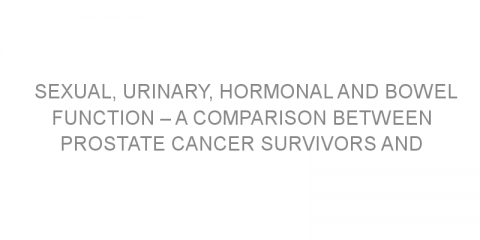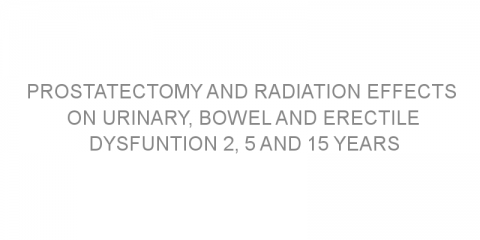This article discusses how tests such as the Oncotype DX or Mammaprint can be used to design individual treatment plans for patients with breast cancer. Patients with stage I and stage II breast cancer are treated similarly. Following surgical removal of a breast tumor, systemic (body-wide) treatment is often used. This secondary treatment is...
Read MoreTreatment(s) now being considered-Hormonal therapy Posts on Medivizor
Benefits of post-operative chemotherapy according to hormone receptor status
In a nutshell This study compared the benefits of chemotherapy according to hormone receptor status. The main findings were: In cancers without hormone receptors, the benefits of adding chemotherapy were significant; In cancers with hormone receptors, chemotherapy only offered modest improvement. Some background Some...
Read MoreBenefits of postoperative chemotherapy vary according to breast cancer type
In a nutshell This study questioned the benefit of adding chemotherapy to postoperative hormonal treatment in the case of lobular breast cancer. Their findings were that chemotherapy seems to offer no additional beneficial effects in women with lobular breast cancer receiving hormonal therapy. Some background There are two main types of breast...
Read MorePostoperative radiotherapy prevents breast cancer recurrence and prolongs survival
In a nutshell This study evaluated if strategies to prevent cancer recurrence are associated with prolonged survival 15 years after treatment. Their main findings were that postoperative radiation managed to prevent cancer recurrence and was associated with higher rates of long-term survival. Some background Early breast cancer is often treated...
Read MoreEvaluating the addition of Capecitabine to postoperative standard chemotherapy
In a nutshell This article presents summarized data from two clinical trials. The trials evaluated the addition of Capecitabine to standard postoperative chemotherapy for patients with high risk early breast cancer. Some background Capecitabine is a chemotherapy drug that is taken orally and slows the growth of tumors. It can be...
Read MoreSexual, urinary, hormonal and bowel function – a comparison between prostate cancer survivors and noncancer men
In a nutshell The present study compared survivors of prostate cancer (PC) to patients of similar sexes and ages that have not had prostate cancer (non-cancer controls) based on the effects of prior treatments and treatment options on sexual, urinary, bowel and hormone functions. The main finding was that PC survivors had poorer sexual and urinary...
Read MoreProstatectomy and radiation effects on urinary, bowel and erectile dysfuntion 2, 5 and 15 years after prostate cancer diagnosis
In a nutshell This paper evaluated the long-term influence of prostate cancer treatment with prostatectomy or radiotherapy on urinary, bowel and sexual function. Prostatectomy was associated with a higher rate of urinary and erectile dysfunction, whereas radiotherapy caused more frequent bowel urgency at 2 and 5 years after diagnosis. Some background...
Read MoreRisks of Incontinence and Sexual Dysfunction following Robotic or Open surgical removal of the prostate : A Comparison study
In a nutshell The present study compared the risks of urinary incontinence (loss of bladder control) and sexual dysfunction following two techniques of radical prostatectomy (complete surgical removal of the prostate gland): traditional open procedure versus robotic-minimally invasive surgery. Main findings: the risks tested were comparably...
Read MoreSurgery versus Clinical Observation for Localized Prostate Cancer
In a nutshell This study compared mortality rates in patients with localized prostate cancer who were managed with either radical prostatectomy (complete surgical removal of the prostate) or careful clinical observation. Initial diagnosis was made by means of Prostate Specific Antigen (PSA) testing. The main finding was that mortality did not differ...
Read MoreRadiation therapy for prostate cancer: how long do urinary-related side effects last?
In a nutshell The present study examined the duration of urinary-related side effects resulting from radiation therapy. Mild to severe urinary side effects were found to last up to 10 years post radiation therapy. Some background Prostate cancer is a slow growing form of cancer that is often managed by active surveillance or observation (delayed...
Read MoreEvaluating survival rates in patients with prostate cancer treated with low-dose-rate brachytherapy
In a nutshell The present study evaluated survival rates in patients with prostate cancer (PC) treated with Low-dose-rate prostate brachytherapy (LDR-PB). The main findings were that LDR-PB alone or combined with hormone therapy offers excellent survival in PC patients. Some background Prostate cancer is the most common type of cancer in men....
Read MorePreserving Fertility during Cancer Treatment
In a nutshell This paper reviews available options for having children after cancer treatment. The main conclusion is that sperm, egg and embryo preservation techniques can help young women have children after breast cancer treatment. Alternative options, such as ovarian tissue preservation, are also being developed. Some background...
Read More













